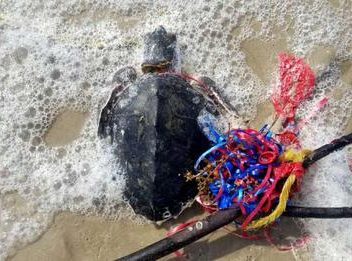Every year, the Florida Legislature, made up of 120 House members and 40 Senate members, convenes to pass legislation. STC closely monitors bills and policies that could positively or negatively impact Florida’s sea turtles and their habitats and, when necessary, calls upon its members and followers to contact legislators about these policies. Outside of the Legislative Session, STC also monitors proposals that could impact sea turtles. Below are STC’s policy priorities for 2024.
Bill sponsors: Senator DeCiglie and Representative Chaney
Bill summary: STC supports the passage of SB 602/HB 321 – Release of Balloons. The passage of this bill would close a loophole allowing countless balloons to enter our waterways and kill marine life, including sea turtles. Currently, Florida Statute 379.233 prohibits the release of ten or more balloons per day, but makes an exception for “biodegradable” balloons, which is not scientifically sound. By removing these two loopholes, Florida can drastically reduce plastic debris in the marine environment and save countless marine animals.

Photo credit: Justin Williams, Turtle Island Restoration Network
The problem to be addressed: A major threat to sea turtles is the ingestion of or entanglement with marine debris, including single-use balloons. Although many Floridians participate in balloon releases as part of a celebration or to honor a loved one, once balloons are released, they can travel thousands of miles before landing. When a balloon bursts and lands in the ocean, sea turtles and other marine wildlife often consume it because of its resemblance to jellyfish. Sea turtles are unable to regurgitate, so once the balloon enters the digestive tract, it can cause an impaction that can lead to death.
The ribbon attached to balloons also wraps around the flippers or necks of sea turtles, inhibiting breathing, eating or swimming. People who monitor sea turtle nesting around Florida report seeing balloons on nesting beaches on an almost-daily basis. Sea turtle rehabilitation facilities in Florida spend hours removing balloon material and other plastic debris from stranded sea turtles. The Florida Fish and Wildlife Conservation Commission has numerous records of sea turtle deaths associated with balloons.
Action needed: Urge your Florida Senator and Representative to support SB 602/HB 321!
Bill sponsors: Senator Burgess and Representative Overdorf
Bill summary: STC is opposed to SB 738/HB 789 – Environmental Management. SB 738 calls for the state’s Department of Environmental Protection (FDEP) and water management districts to conduct a “holistic review” of their coastal permitting processes and permit programs in order to “increase efficiency” within each program.
How this bill could harm sea turtles: Although “efficiency” in government permitting programs seems like it would be a good thing, used in this context, “efficiency” could mean reducing important checks and balances in place to protect Florida’s natural resources, including our beaches and waterways. Currently, state regulations are in place that dictate the timing, location, and type of coastal construction that can be completed on Florida’s beaches to ensure that it does not harm federally-protected sea turtles and their habitat. If SB 738 passes as written, these important barriers could be weakened, leading to further improper development on Florida’s beaches and putting our sea turtles and largest economic driver at risk.
Action needed: Urge your Florida Senator and Representative to oppose SB 738/HB 789!

Photo credit: Gumbo Limbo Nature Center
Bill sponsors: Senator Martin and Representative Yeager
Bill summary: STC is opposed to SB 1126/HB 1641 – Regulation of Auxiliary Containers. If passed, this bill would ban all local governments in Florida from banning any kind of container that is used to transport merchandise, food, or beverages, including single-use plastic. The bill also proposes to cancel the update of the State’s retail bag study, which would analyze the need for new or different regulation of auxiliary containers, wrappings, or disposable plastic bags used by consumers to carry products from retail establishments.
How this bill could harm sea turtles: Consuming or being entangled in single-use plastics is one of the largest threats to sea turtle survival. Single-use plastic is ubiquitous in the marine environment and can impact sea turtles at every life stage, from hatchling to adult. One way that governments have addressed this problem is by limiting the use of single-use plastics – such as banning polystyrene, straws, cups, utensils, and more – within their jurisdiction. The State has already preempted local governments’ ability to ban plastic bags; this bill would eliminate local governments’ ability to ban the remaining types of single-use plastic that can be harmful to wildlife.
Action needed: SB 1126 was temporarily postponed in the Senate Community Affairs Committee on February 6. We are hopeful that this bill will not move forward for the rest of the Session but are remaining vigilant. Thank you to all who advocated against this bad bill!
Our legislative priorities are focused on reducing the many threats that Florida’s sea turtles face, including: climate change and sea level rise, risky coastal development, plastic pollution, degraded water quality and associated impacts to sea turtle food sources. In 2024, STC’s general legislative priorities are as follows:
Florida residents and organizations can have the most influence by directly contacting legislators in their district. If you are unsure who your Florida Senator or Representative is, click the links below:
Find Florida Senators: https://www.flsenate.gov/senators/find
Find members of the Florida House Representative: https://www.myfloridahouse.gov/findyourrepresentative
While sending an email about a bill or policy can be an effective way to reach a legislator, calling and stating your concerns is more effective, and attending committee meetings where bills will be considered and signing up to speak is even more effective.
How non-Floridians can help
People residing outside the state of Florida can still make a difference for sea turtles. If you are concerned about a bill or policy, please contact the relevant entity mentioned in each “action needed” section.
If you have additional questions about STC’s Policy Priorities, please email Stacey Gallagher at stacey@conserveturtles.org.